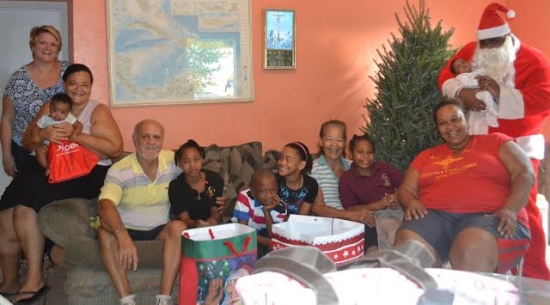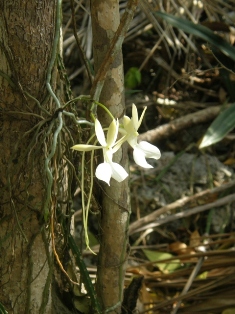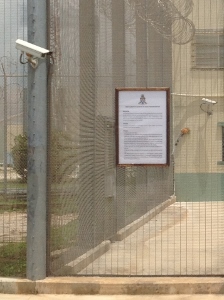Archive for January, 2014

Students prepare for jobs with mock interviews
(CNS): Clifton Hunter High School (CHHS) Year 11 students arrived at school Friday 17 January out of uniform and dressed for success, ready to participate in a mock interview event that will teach them how to prepare and present themselves for employment interviews, the Ministry of Education, Employment and Gender Affairs said iun a release. In preparation for the mock interviews, as well as real life and future employment prospects, students have been learning about the process of applying and preparing for employment.
Students have learned how to write a professional cover letter and resume, and learned about professional language and personal presentation. The objective of this learning experience is to provide life-skills lessons for students to experience and understand the process of applying and interviewing for a job so they know what to expect when it happens in real life.
Fifteen businesses participated as interviewers and 110 students were interviewed. The students wrote a cover letter and attached their resume in application for the mock-interview for one of the many positions on offer from business participants. The interviews were held at CHHS from 9:30 am – 11:30 am.

Home-based dialysis provides patient freedom
 (CNS): A new Dialysis Unit at the Cayman Islands Hospital is now providing a home-based dialysis programme, which, for the patients who are able to use this service, has led to more flexibility in the timing and administration of dialysis treatments and an overall better quality of life. "This programme offers patients the opportunity to take control of their treatment, giving them far greater flexibility and independence,” said HSA Internist and Nephrologist, Dr Nelson Iheonunekwu, explaining that it means that they no longer have to visit the Dialysis Unit three times a week for their treatment. He said the programme takes the form of continuous ambulatory peritoneal dialysis and automated peritoneal dialysis.
(CNS): A new Dialysis Unit at the Cayman Islands Hospital is now providing a home-based dialysis programme, which, for the patients who are able to use this service, has led to more flexibility in the timing and administration of dialysis treatments and an overall better quality of life. "This programme offers patients the opportunity to take control of their treatment, giving them far greater flexibility and independence,” said HSA Internist and Nephrologist, Dr Nelson Iheonunekwu, explaining that it means that they no longer have to visit the Dialysis Unit three times a week for their treatment. He said the programme takes the form of continuous ambulatory peritoneal dialysis and automated peritoneal dialysis.
“Patients are trained in how to administer their own dialysis treatments and many undertake their exchanges in the comfort of their own bedroom," Dr Iheonunekwu said. "Additionally,the home-based unit is portable, making it convenient for the patient. Prior to doing their dialysis treatment, patients are instructed to follow the necessary hygiene procedures; the actual exchange takes about 20 minutes. Some patients have to undertake their dialysis every four hours, some every six. The flexibility with the home-based programme means that patients are often able to go to work and live a more normal life."
The doctor advised that studies have shown that there is very little difference in life expectancy of patients who undertake the home-based peritoneal dialysis and those in a hospital-based programme.
“Cayman is unfortunately, like the rest of the Western world, currently seeing an increase in the number of patients suffering from chronic kidney disease," explained Lizzette Yearwood, CEO of the Cayman Islands Health Services Authority. "Our chronic kidney disease and dialysis population has grown exponentially over the years; in 1998 there were 10 dialysis patients compared to 52 patients requiring dialysis in 2012. This represents a 420% increase over a period of just 15 years.”
“I am pleased to see that a number of our patients are benefitting from this additional service. The Health Services Authority is committed to providing the best possible care to all our patients and stresses the importance of maintaining healthy lifestyles, which is one of the most important tools in the prevention of many chronic diseases. We therefore encourage our patients and the public to adopt healthy habits and lifestyles, thereby reducing their chances of developing chronic illnesses such as chronic kidney disease. In that way the need for dialysis will hopefully be reduced in time.” she said.

Radio station helps families in need at Christmas
 (CNS): Christmas for Marie Bush and her five children, who lost their George Town home to fire just over a month before the holidays, was made a little brighter, thanks to local radio station X017's Christmas Wish List promotion. In response to an appeal on the station, listeners of the morning show hosted by Blake & Erin, who spearheaded the initiative, nominated 22 people deemed to be in real need of a helping hand at Christmas time. This was a record number, which, the radio station said, was a sign of changing times in Cayman. The other household to benefit was another home in George Town, where four adults and seven children were feeling the pinch over Christmas.
(CNS): Christmas for Marie Bush and her five children, who lost their George Town home to fire just over a month before the holidays, was made a little brighter, thanks to local radio station X017's Christmas Wish List promotion. In response to an appeal on the station, listeners of the morning show hosted by Blake & Erin, who spearheaded the initiative, nominated 22 people deemed to be in real need of a helping hand at Christmas time. This was a record number, which, the radio station said, was a sign of changing times in Cayman. The other household to benefit was another home in George Town, where four adults and seven children were feeling the pinch over Christmas.
The two adult women, sisters Luisa Bodden-Black and Rosita Bodden, were both unemployed – one due to illness and the other was laid off. (Photo below)
The goal of the promotion is to grant Christmas wishes and offer assistance to persons in need and in the past, selected families have received gifts such as computers, new clothes, toys, Christmas trees, groceries, and payment of various bills.
In addition to X107.1 and its parent company DMS Broadcasting, several local businesses joined in the effort to support needy families over the recent holiday period. These included Digicel, Pooley Cabinets, Generali Worldwide, Trees for Life and International Medical Group.
Both families received presents for the children, a Frasier Fir Christmas tree complete with lights, a Sony SP phone with one month of free data and $500. All items were delivered by the radio stations’ own Santa Claus in a surprise visit to the winners’ homes.
“We were surprised by the number of responses to the promotion and very touched by the stories. Many families in our community have been hurting for a while and it was quite encouraging that several companies joined DMS Broadcasting in getting together donations of cash and kind. We are glad that together we were able to make life better for two families,” stated Blake Rogers of X107.1.


No sign of missing diver, search resumes Monday
(CNS) Updated: An air and sea search currently underway for a missing diver has so far proved unsuccessful and police from the Marine Unit said divers and local vessels will be welcome to assist when the search resumes Monday morning at 7am. The RCIPS Marine Unit, its air support as well as uniform officers and a number of local dive vessels began searching for the diver, who is visiting from the USA, following a report on Sunday morning that he had gone missing off Seven Mile Beach in the heart of Cayman’s tourist district. The man, who was taking part in an offshore dive, had surfaced with his buddy but did not make it back to the boat.
At around 10:20 this morning 911 received a call from the local dive company that the 57-year-old man visiting from the United States was missing. The boat captain and crew started the search when he failed to make it back but with no sign they reported the matter to the authorities.
A search and rescue effort was launched involving Marine Unit, the police helicopter, dive vessels and officers on shore but so far the diver remains missing.
Sergeant Richard Scott of the Marine Unit said efforts will continue at 7:00 am tomorrow ifthey are not successful this afternoon. Anyone who can assist with vessels or diving can contact him at 949-7710 or 325-8092 tomorrow morning if they wish to assist in the coordinated search.
.

Archer gets back $6M interest
 CNS): The ministry of finance has managed to reduce government’s interest on the lifetime of its loans by more than $6 million by renegotiating the loans it currently has with the lenders. Government officials said that these “efforts and strategies implemented” will save the public purse some CI$6.2 million in interest costs over the next ten years. The ministry has negotiated lower fixed term interest rates for five of government's existing loans held with a local commercial bank that totalled CI$88.4 million as at 30 November 2013. The new and lower fixed term interest rates range from 1.25% to 2.71% per annum, down from levels of 2.82% to 4.25% annually for the preceding five years of 2008–2013.
CNS): The ministry of finance has managed to reduce government’s interest on the lifetime of its loans by more than $6 million by renegotiating the loans it currently has with the lenders. Government officials said that these “efforts and strategies implemented” will save the public purse some CI$6.2 million in interest costs over the next ten years. The ministry has negotiated lower fixed term interest rates for five of government's existing loans held with a local commercial bank that totalled CI$88.4 million as at 30 November 2013. The new and lower fixed term interest rates range from 1.25% to 2.71% per annum, down from levels of 2.82% to 4.25% annually for the preceding five years of 2008–2013.
The interest rates are now fixed for the remaining life ofeach of the five loans.
"The government is very pleased with the negotiations and the achievements of the ministry in meeting the goals and objectives of the government to be fiscally prudent and reduce expenditure,” Finance and Economic Development Minister Marco Archer said. “For fiscal year 2013/14, CI$0.6 million in interest cost savings will be realized and will have a positive impact on the 2013/2014 budget surplus and debt service ratios, while building public trust and confidence in the government’s fiscal performance."
Archer had promised to renegotiate all of government’s debt in an effort to reduce its annual interest payments, which are in excess of $30 million. The previous administration had also made efforts to do so by trying to move the loans with new closed door deals. However, there were concerns raised about those efforts, ultimately costing the public purse as a result of penalty clauses. By negotiating with the existing lenders, Archer has managed to avoid penalties and the cost of re-tendering.
However, this renegotiation only represents a fraction of governments existing debt, which is in excess of half a billion dollars.

Over 900 TLEPs remain
 (CNS): Well over 500 foreign workers out of almost 1,500 who originally held Term Limit Exemption Permits (TLEPs) have left the Cayman Islands, according to government officials, but the rest are still here. Of the 1,459 TLEP holders on island when government changed the immigration law allowing them to stay, 576 have applied for work permits, 274 have been granted a further work permit, 8 remain on Island as visitors and 547 have left the country. Despite concerns that the immigration department would be dealing with a surge of applications, only 54 have so far applied for permanent residency (PR).
(CNS): Well over 500 foreign workers out of almost 1,500 who originally held Term Limit Exemption Permits (TLEPs) have left the Cayman Islands, according to government officials, but the rest are still here. Of the 1,459 TLEP holders on island when government changed the immigration law allowing them to stay, 576 have applied for work permits, 274 have been granted a further work permit, 8 remain on Island as visitors and 547 have left the country. Despite concerns that the immigration department would be dealing with a surge of applications, only 54 have so far applied for permanent residency (PR).
Those who have applied for PR will be judged on a new, stricter set of criteria and not everyone will qualify. Fees have also been increased for those who seek permanent residency. Government said it aims to only grant PR to those people who can have a positive impact on the country. It is not intended for those that would become a risk or a liability to the Cayman Islands.
The number of people on TLEPs who have applied for PR affirms the belief of the Progressives government, officials said in a release Friday.
“We knew from the outset, and even stated, that not all of those people on these special permits would want to seek permanent residency and the numbers show that we were right,” Premier Alden McLaughlin said.
Those on the exemption permits that wanted to stay in Cayman had to apply for new work permits under the reformed Immigration Law, which was steered through the Legislative Assembly in October. According to the release from the premier’s office, government is working with employers to ensure that Caymanians are hired for jobs vacated by those who held TLEPs through the National Workforce Development Agency.
Although officials said the departing workers left 547 positions open that could be filled by Caymanians, they did not say how many were or how many were filled by new permit holders.
Independent MLA Ezzard Miller recently stated that government needed to give a detailed update about how many Caymanians have been placed in work as a result of the planned assistance, which it said it was giving to local workers at the time of the immigration reforms. He said he had grave concerns that the push to get locals in work did not happen and the government has done little or nothing to address the continuing problem of rising local unemployment.
Term Limit Exemption Permits were introduced by the former UDP government. Most of those on the special permits had been working in the Cayman Islands since 2005 and 2006 and would have been required to leave upon reaching their seven-year term limit. The UDP government amended the law in such a way that all TLEPS expired in October last year, something the Progressives’ government deemed as disruptive to the country and the economy.
“We would have had close to 1,500 people with dependents leaving the country at once; people not buying groceries, not paying rent, not buying gas. It just wasn’t in the best interest of the Cayman Islands,”said McLaughlin.
The government has said the second phase of Immigration reforms will be made this year and focusing on the work permit system, in particular the relationships between the granting of work permits and unemployment amongst Caymanians. A committee is slated to make a full report to Cabinet in April.

Cayman faces serious environment risks
 (CNS): A new report by the UK’s Environmental Audit Committee on sustainability in the overseas territories has raised a litany of serious environmental risks in Cayman, which was one of the territories it visited during the course of compiling the report. Taking the British government to task over its failure to ensure sufficient guardianship of the environment in its territories, the report raises concerns about the Cayman Turtle Farm, waste management problems, uncontrolled development and the failure to use the Environmental Protection Fund in Cayman. The report also found that inadequate development controls and no statutory requirements for EIA’s are threatening the islands.
(CNS): A new report by the UK’s Environmental Audit Committee on sustainability in the overseas territories has raised a litany of serious environmental risks in Cayman, which was one of the territories it visited during the course of compiling the report. Taking the British government to task over its failure to ensure sufficient guardianship of the environment in its territories, the report raises concerns about the Cayman Turtle Farm, waste management problems, uncontrolled development and the failure to use the Environmental Protection Fund in Cayman. The report also found that inadequate development controls and no statutory requirements for EIA’s are threatening the islands.
The in-depth report covers all of the UK’s territories and raises a significant number of issues relating to myriad environmental problems. However, Cayman features heavily in the report as it was one of the case studies.
As an example of the dangers of uncontrolled development, the report highlights a situation in Little Cayman of developers clearing land in preparation for a significant sub-division, which has caused concern for residents but seems to be flying under the radar regarding local activists.
“We identified a pertinent example how inadequate development controls impact the environment when we visited the Cayman Islands,” the report states.
Pointing to the lack of a development plan for Cayman Brac and Little Cayman and minimal planning controls, the committee said that a British company, Crown Acquisitions, had purchased land on all three Cayman Islands, which it has subdivided into undeveloped plots.
“Crown Acquisitions told us that it owns approximately 200 residential plots with planning permission on Little Cayman,” the report said. However, CNS understands that Crown Acquisitions has not, in fact, made a single planning application on the Sister Islands.
The authors went on to explain that given the size of Little Cayman and its healthy marine environment, as well as it being home to the largest red-footed booby population in the Caribbean, and the fact that Crown Acquisitions told the committee “that it had not assessed the impact of its proposed development on Little Cayman's infrastructure,” there was significant concern about the development and the impact on the islands’ unique environments.
“Although they are acting within the current development framework, developers are risking the biodiversity and ecological sustainability of the Cayman Islands. That is the direct consequence of inadequate development controls and lack of comprehensive governance arrangements,” the committee warned.
The audit committee berates the Foreign and Commonwealth Office for not meeting its constitutional responsibility to ensure that good governance arrangements in the UK's overseas territories include sustainable development, effective development controls and statutory environmental impact assessments for major developments and strategic infrastructure plans. It presses the office to direct governors to advocate strongly for the introduction of effective development controls.
The report describes the UK Government as having “constitutionally subcontracted environmental management” directly to the territories but the committee found that this does not devolve away the UK's ultimate responsibility under international law.
“The overseas territories are plainly not independent sovereign States. Their external relations remain the responsibility of the United Kingdom, the sovereign power. Accordingly, the United Kingdom is responsible for each of the territories under international law,” the report states.
With more than 500 globally threatened species in the territories and undisturbed habitats of international significance, the UK government has acknowledged the importance and sensitivity of the rich biodiversity among them but the committee accused the FCO of abdicating its responsibility.
“During our inquiry, the UK Government expressed general but unspecified aspirations to 'cherish' the environment in the overseas territories, but it was unwilling to acknowledge or to address its responsibilities under United Nations treaties. This was disappointing, because the environment in the Overseas Territories is globally significant and comprises 90% of the biodiversity for which the UK Government has responsibility,” the report said
In Cayman alone the report points to a litany of environmental problems and while it welcomed the introduction of the National Conservation Law, it had significant concerns about waste management practices in the Cayman Islands.
“We saw old refrigerators being crushed with no regard to CFCs and recycling that ranged from minimal to non-existent,” the report reads. “The waste management site on Grand Cayman appeared to be inadequately lined and waste may be seeping into the water table.The facilities on Cayman Brac and Little Cayman were even less convincing. The facility on Little Cayman was lined, but the lining had been fractured by the unregulated burning of rubbish. The facility on Cayman Brac was unlined and waste appeared to be seeping into a nearby lake
“Local authorities in the UK have the expertise to address those issues. Cayman Islands Government and the UK Government might wish to consider developing a partnership with a UK local authority to share best practice,” the report.
Pointing to Cayman’s Environment Protection Fund, which is currently worth more than £40 million, none of which has been used for environmental protection, the committee said the UK Government could have persuaded the Cayman Islands Government to use it for its intended purpose.
“If the fund were used for its intended purpose, it would allow UK funding for environmental protection, such as Darwin Plus, to be directed to other UKOTs which have more limited resources than the Cayman Islands and which do not have access to their own environment funds,” they wrote.
However, pressure from the FCO regarding Cayman’s finances had led to the government keeping hold of the $40 million to boost its reserves.
“The UK Government is prepared to exercise hard and soft power in relation to financial matters in the UKOTs, but it is apparently not prepared to exercise those powers to protect biodiversity and to promote environmental sustainability," the report found, as it pointed to a long list of recommendations about dealing with the OT’s environment issues.
Check back to CNS regarding the report’s findings on the Turtle Farm.

CJ finds bail law lines up with human rights
 (CNS): A murder suspect who has been in jail on remand for almost 18 months has failed in his bid to have the bail law declared incompatible with the Bill of Rights and the Constitution. In a ruling delivered on Christmas Eve following a judicial review that was heard in September, Chief Justice Anthony Smellie found that the law did not clash with a person’s rights to liberty enshrined in the constitution. Brian Borden, who is due to stand trial on Monday for the murder of Robert Mackford Bush, had argued via his attorney, Nick Hoffman, that the bail law was disproportionate because of the presumptive denial of bail for murder suspects, and many others under Cayman Islands Law, claiming it breached human rights.
(CNS): A murder suspect who has been in jail on remand for almost 18 months has failed in his bid to have the bail law declared incompatible with the Bill of Rights and the Constitution. In a ruling delivered on Christmas Eve following a judicial review that was heard in September, Chief Justice Anthony Smellie found that the law did not clash with a person’s rights to liberty enshrined in the constitution. Brian Borden, who is due to stand trial on Monday for the murder of Robert Mackford Bush, had argued via his attorney, Nick Hoffman, that the bail law was disproportionate because of the presumptive denial of bail for murder suspects, and many others under Cayman Islands Law, claiming it breached human rights.
While the law does remove the entitlement to bail of people charged with a long list of offences it does not prevent them from applying and demonstrating why they should not be held on remand.
The Chief Justice Anthony Smellie, dismissed the application and said that, “notwithstanding the purported disentitlement to bail expressed in section 17(2),” it should “appropriately be read down to make it compliant with the Bill of Rights requirement of prompt and continuing judicial oversight, when the court will be entitled to account of all relevant considerations pointing for and against the grant of bail for any of the listed offenses.”
He added that any lack of clarity or ambiguity was neither disproportionate nor arbitrary and
“not incompatible with the Bill of Rights.”
Given that the hearing and subsequent ruling came relatively late in the day for Borden who will begin his trial on 20 January the case has implications for other inmates held on remand for murder or various other serious offences.
Although the law does not mandate that murder suspects must be on remand it is almost unheard of for the courts to release anyone on bail who is charged with killing another individual. Regardless of the standard of evidence or circumstances surrounding the case or the allegation, in each and every bail application the crown simply argues that the mandatory penalty of a whole life sentence for any person convicted of murder here makes them a significant flight risk and the courts rarely if ever disagree.
Hoffman had argued that the bail law denied certain defendants the right to be considered innocent until proven guilty. By listing offences where bail should be denied until the defendant could prove why they should be let out, the law was disproportionate because it already sets out the reasons why people should be denied bail in the interests of justice regardless of the crime.
When people apply for bail the crown can argue legitimately that someone should not be bailed for various reasons whatever offence they have been accused of they can point to overwhelming evidence, a genuine flight risk of a foreign national, the danger they will commit another crime or interfere with witnesses among other statutory reasons. Hoffman submitted that there was no need for the law to add to that list with specific offences which was essentially overkill.

Experts rating CI road safety
 (CNS): A group of international road engineering safety experts are currently in the Cayman Islands conducting an assessment of the country’s 238 miles of road in order to measure the risk factors on the network and offer ways to mitigate potential hazards. Cayman has a very high road crash rate for the size of the country, double the World Health Organisation’s average with 16.5 people per 100,000 being killed on our roads annually. While many factors contribute to road crashes, experts from the International Road Assessment Programme (iRAP), which is partnering with the NRA on this project, say the only one that governments can manage is the road itself.
(CNS): A group of international road engineering safety experts are currently in the Cayman Islands conducting an assessment of the country’s 238 miles of road in order to measure the risk factors on the network and offer ways to mitigate potential hazards. Cayman has a very high road crash rate for the size of the country, double the World Health Organisation’s average with 16.5 people per 100,000 being killed on our roads annually. While many factors contribute to road crashes, experts from the International Road Assessment Programme (iRAP), which is partnering with the NRA on this project, say the only one that governments can manage is the road itself.
The experts say that things as simple as better road markings, sidewalks and intersection design can significantly lower the risk to all road users, including pedestrians, cyclists as well as drivers.
The National Roads Authority is using part of its roads budget for this financial year to pay for the assessment, which is costing around US$155,000 and will result in a full report on all the local roads and grade each one on a star rating — five star roads are the safest and 1 star the highest risk. With the help of the iRAP, local officials say they hope to upgrade all of the roads rated below three stars.
While road improvements cannot stop drunk drivers, people texting at the wheel, speeding or poor standards of driving and road awareness, or any of the other variable that may cause smashes, better engineered roads can be more forgiving, experts said at a press briefing Thursday. In other words, better designed and engineered roads can reduce the likelihood of accidents but when collisions still occur, as they will, those involved are less likely to be killed.
Kurt Tibbetts, who is now the minister in charge of roads, explained that the works ministry had been keen to undertake the assessment because of the number of fatal smashes on Cayman’s roads and the emergence of some specific places where crashes were happening more frequently.
“It was felt to be in the country's best interest to do a road assessment in order to determine what actions needed to be taken to mitigate accidents at specific locations,” Tibbetts said Thursday as he pointed to the grief suffered by families when they lose loved ones on the roads, as well as the medical expenses for those badly hurt and the loss of productivity to the country and earnings to families.
He explained that iRAP would not only assess the roads but also pass on expertise to the NRA team, offer technology advances, cost effective solutions and tracking on the road network performance when enhancements are in place. The minister said that some changes could be very cheap and simple but still save lives, as he noted that at present some 50 countries are engaged in a similar exercise with iRAP.
Using a special vehicle equipped with specialist gizmos and techy equipment, the NRA and iRAP have already begun taking the measurements. Once completed, a report and star rating will be given on all roads and the non-profit organization will then offer recommendations and solutions, which Tibbetts said would be implemented by CIG as money became available.
The iRAP focuses on 30 design features that influence crashes and the severity of crashes.
The experts said they had already spotted issues in Cayman relating to a lack of sidewalks and delineation on some of the roads as well as light pole spacing on fast roads.
Acting NRA Director Edward Howard said he was delighted that the ministry was supporting the initiative as it would give the authority a comprehensive safety measure of all the roads. The end goal was to ensure high risk roads were eliminated, he added.
Howard explained the assessment was part of the so called ‘4Es’ relating to road safety (education, engineering, enforcement and emergency management) and this was the engineering part.

Woman robbed at ATM
(CNS): Police have arrested a local man following a robbery at a bank ATM Thursday lunchtime in downtown George Town. An RCIPS spokesperson said that the incident occurred at the machine outside Butterfield Bank in Fort Street at around noon. A 28-year-old woman had withdrawn cash from the ATM when she was approached by a man armed with a knife. He threatened the women and grabbed her hand, running off with the cash she had withdrawn. The suspect reportedly headed off towards Fidelity Bank through the car park at the rear. The woman sustained a small cut to her forearm when the suspect grabbed her but she did not require medical attention, police said.
The police receive a description of the suspect as a Caribbean male with a light brown complexion, aged around 25-26 years, of slim build and with a clear hair line. He was wearing jean pants and a grey hooded top. As a result, a police investigation was launched and man was arrested around two hours later in the Shedden Road are on suspicion of robbery. Police said he remains in police custody while enquiries continue.
Anyone who was in the area of the bank around noon today and witnessed the robbery is asked to contact George Town CID. Anyone who saw the suspect before the incident, or running off afterwards, is also asked to come forward. Information can be passed on 949-4222, the RCIPS tip-line 949-7777 or via Crime Stoppers 800-8477(TIPS).